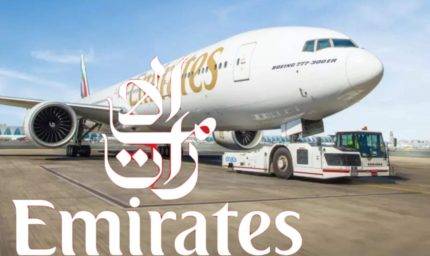Nigerians rejoiced on May 16, 2024, as Emirates Airlines announced its return to the country starting October 1st. This development is seen as a significant step towards rejuvenating the aviation sector and the broader economy, which had been impacted by the airline’s departure. The hiatus, which began in 2022 due to repatriation issues, left a substantial void in Nigeria’s international travel network.
The announcement was met with enthusiasm, especially from business travelers and the diaspora community who frequently use the Lagos-Dubai route. Emirates Airlines Deputy President and Chief Commercial Officer Adnan Kazim expressed optimism, stating, “We’re excited to resume flights. The Lagos-Dubai route has been popular, and we hope to reconnect travelers to Dubai and our vast network.” The Emirates Airlines return is expected to restore much-needed connectivity and facilitate easier travel for Nigerians heading to the Middle East and beyond.
Economic Implications of the Hiatus and Return Of Emirates Airlines
The suspension of Emirates flights in 2022 was a direct result of the Central Bank of Nigeria’s (CBN) policy restricting access to the US dollar, which prevented the airline from repatriating $85 million in revenue. This policy, part of an attempt to manage the severe foreign currency shortage in Nigeria, led Emirates Airlines to reduce its flights from 11 to seven before halting operations entirely. The gap left by Emirates Airlines could not be fully filled by other carriers, such as Air Peace, Ethiopian Airlines, Egypt Air, and Etihad Rwanda, leading to a notable disruption in the aviation market.
The hiatus had significant economic ramifications. Many Nigerians employed by Emirates Airlines lost their jobs, and the aviation sector missed out on vital revenue opportunities. Moreover, the inability to repatriate funds undermined foreign direct investment (FDI) confidence in Nigeria, as international companies saw the risks associated with financial operations in the country. The return of Emirates Airlines is therefore seen as a positive signal to investors and a step towards restoring trust in Nigeria’s economic policies.
Diplomatic Efforts and Future Prospects
President Bola Tinubu played a crucial role in the return of Emirates Airlines, engaging in diplomatic negotiations with the President of the United Arab Emirates, Sheikh Mohamed bin Zayed Al Nahyan. Although the details of their agreement remain undisclosed, the outcome is clear: Emirates Airlines will resume its operations, and there is a strong possibility that the visa ban on Nigerians traveling to the UAE will soon be lifted. This development is anticipated to significantly benefit Nigeria’s economy by boosting tourism, business travel, and bilateral trade.
The return of Emirates Airlines is also expected to have a positive impact on employment within the aviation sector. Nigerians who lost their jobs due to the airline’s suspension are likely to be rehired, and the increased flight activity will generate more revenue for the sector. Additionally, the expected lifting of the visa ban will enhance Nigeria’s international standing and promote further economic interactions between Nigeria and the UAE. This renewed partnership heralds a new chapter of growth and cooperation, contributing to Nigeria’s efforts to stabilize and grow its economy.
Strengthening Bilateral Relations
The return of Emirates Airlines heralds a new chapter in the enduring bilateral relationship between Nigeria and the United Arab Emirates. This development is set to enhance not only passenger connectivity but also the crucial trade links between the two nations. With the resumption of daily passenger flights, Emirates’ cargo arm, SkyCargo, is poised to significantly boost the trade relationship by offering over 300 tonnes of belly-hold cargo capacity to and from Lagos every week. This expanded cargo capacity is expected to facilitate the smoother and faster transportation of goods, thereby strengthening commercial ties.
According to the National Bureau of Statistics (NBS), Nigeria’s total trade in the second quarter of 2023 was valued at N12,741.96 billion, with exports standing at N7,015.71 billion and imports at N5,726.25 billion. The return of Emirates is anticipated to further elevate Nigeria’s foreign trade, enabling the country to transport goods to key markets in the UAE, Malaysia, Hong Kong, and Bahrain. This increased trade volume is expected to drive economic growth, creating more opportunities for businesses and fostering a more robust economic partnership between Nigeria and the UAE.
Impact on the Aviation Sector: Price War and Market Dynamics
The aviation sector in Nigeria is currently experiencing a significant shift, primarily due to a price war initiated by Air Peace with its low fares for Lagos-London flights. This competitive pricing strategy has compelled many airlines to follow suit, leading to a more dynamic and competitive market environment. The return of Emirates Airlines adds a new dimension to this scenario. Aviation experts are divided on how Emirates’ re-entry will influence this price-sensitive market.
Aviation analyst Emeka Okoro suggests that Emirates might initially engage in the price war to regain its market share. However, given Emirates’ premium brand positioning, it is likely that the airline will eventually stabilize fares to maintain its brand value. This strategy could lead to a balanced market where competitive pricing coexists with premium service offerings, thereby providing passengers with a range of options tailored to different preferences and budgets.
A Welcome Development for Nigeria
Emirates Airlines return is widely regarded as a positive development for Nigeria. While the precise economic impact remains to be fully realized, the potential benefits are substantial. Increased trade facilitated by Emirates SkyCargo is expected to boost revenue and create jobs, thereby contributing to economic growth. The enhanced connectivity provided by Emirates also promises to attract more business and leisure travelers, further stimulating the local economy.
Emirates Airlines re-entry into the Nigerian market is a win-win for both the airline and the country. For Emirates, it represents a strategic move to expand its footprint and capitalize on the growing demand for air travel and cargo services in Nigeria. For Nigeria, it signifies an opportunity to strengthen bilateral trade relations, enhance economic growth, and improve the overall connectivity with key global markets. As both entities leverage this renewed partnership, the prospects for mutual growth and prosperity appear promising.
Table of Contents
Discover more from OGM News NG
Subscribe to get the latest posts sent to your email.













